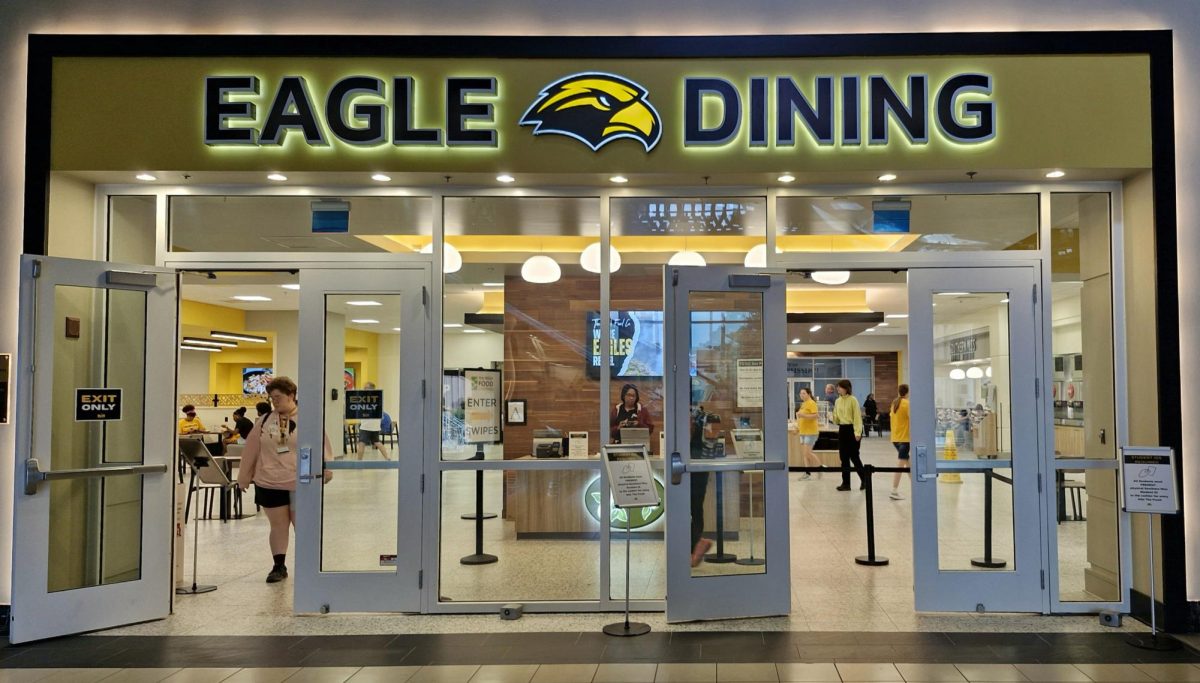Across the board, The Student Printz editorial staff avoids the Fresh Food Company, each for our own reasons. We have stayed away for a variety of reasons including bad experiences with service and food quality, our unfavorable views of the selections offered and our dislike of the pricing or nature of the meal plans.
Admittedly, when it comes to what we eat, we are stubborn and not easily swayed.
Our personal reservation regarding Eagle Dining reflect those issues presented in “Listen Up, Eagle Dining,” a blog by USM junior Carmine Harrell and in a Change.org petition started by USM sophomore Jarrod Colley. Our opinions, like those voiced by members of the USM set, are not necessarily representative of the on-campus community, but for what it is worth, we have felt validated by response among community members.
While our editorial staff will not be returning to the Fresh in all likelihood, The Student Printz as an institution, like the university itself, is vested in our service to the campus community. And like the university, we have considered the practical considerations of addressing these given concerns.
Ultimately, Aramark, or its analog, is here to stay for the foreseeable future. The independent, locally-owned provider model is not viable in current economic climate, especially for a university facing regular budget cuts. Aramark funds upkeep of its facilities, and the university receives significant funding through individual sales and meal plans.
To that end, for those living on campus, do not expect the meal plan requirement to change. The university could compensate for dropping the requirement by shifting laterally to require certain students demographics, such as all freshman, to live on campus.
Yet, due to the predictable backlash from such a change, we doubt that will be chosen as an alternative.
To the credit of Eagle Dining and the university, Eagle Dining possesses an excellent track record in terms of health inspections, and the two parties have been working to improve the USM dining experience well before Harrell’s blog post.
As in prior semesters, Eagle Dining will be modifying food stations and adding new menu items to the Fresh to reflect the expressed desires of students for next semester. Additionally, Eagle Dining will extend hours of operation for a trial period, which will result in a permanent change if successful.
In regard to the Fresh staff, considering the non- competitive, seasonal nature of the service positions, which filled from a small local employment pool and characterized by rotating hours and regular turnover, we understand that the Fresh’s service is less than perfect.
After all, the Fresh staff are people, who have their good days and bad and who are paid in line with industry standard, which is not a lot. In fact, they are generally paid the minimum. However, as representatives of Eagle Dining and as food service providers, any issues with service, food preparation or food quality should be documented and reported.
Beyond its preparation, the intrinsic quality of food provided is subject to the less than desirable domestic market for large-scale food service operations, the corporate-level purchasing practices of Aramark and consumer expectations. Compared to the peer countries, domestic consumers spend a smaller percentage of their income on food and generally have poorer eating habits.
Reportedly, one of the most commonly requested menu additions for the Fresh was Southern cooking, which does not connote health-oriented diets as much as a desire for tastier options.
Next semester, Fresh visitors can expect to see an improvement on both fronts: a more prominent health section and a Southern cooking station.
According to the university, the recently publicized criticism of Eagle Dining did little to affect established plans to improve the Fresh. However, the criticism is characteristic of a component essential to improving Fresh Food patrons’ experiences — feedback.
As a result of the criticism, dialogues between the SGA, the university and Eagle Dining have opened. Eagle Dining needs consumer input, especially specific suggestions and complaints, to inform changes. USM needs feedback to inform any changes the community believes should be pursued in the negotiation of the Aramark contract, which will be up for renewal February 2017.
Fresh patrons can see change by holding USM and Eagle Dining accountable. So, we hope those of you who visit the Fresh will keep doing what you are doing. Keep reporting your complaints, namely to Eagle Dining General Manager Gavin Moon, who invites your feedback. No sweeping changes will make campus dining magically wonderful, unfortunately. But the Eagle Dining experience can definitely be improved, and patrons can better it.




















